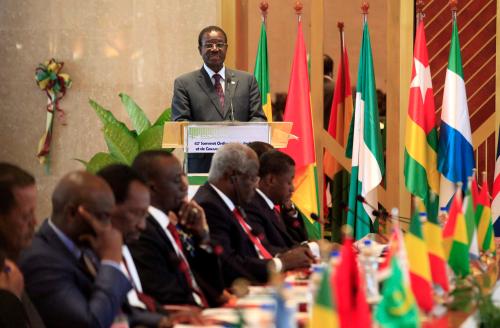The Brookings Africa Growth Initiative 2013 Foresight Africa report highlights some of the key issues and events that are likely to impact on Africa’s development this year. As we look forward to the some of the key priorities for the continent in 2013, it is also appropriate look at the various themes and perspectives that dominated discussions on Africa’s development in 2012, many of which we can expect to remain priorities in 2013. Below are some of themes and my perspectives on how they will continue to be relevant this year:
Inclusive Growth
One of the most common themes in Africa’s development in 2012 was inclusive growth. Although most of the African countries have experienced decent growth rates for over a decade, the benefits of this growth have not been widely shared and have instead been concentrated among just a few members of the population. As a result, the continent has experienced increasing disparity of incomes and overall human development. Thus while the high growth rates have earned Africa praise, growth that is not shared by a larger proportion of the population has the potential to create political instability and it is ultimately also not sustainable. How to achieve inclusive growth will remain important in the future and the priority should be to implement workable strategies that have been identified in discussions and policy documents.
Regional Integration
Accelerating the pace of regional integration was another common theme at various policy forums and conferences on Africa and in several publications in 2012. The importance of regional integration to Africa’s development was highlighted at the African Heads of State Summit held early last year during which country leaders committed to accelerate the pace of continental integration with the goal of reaching a continental free trade area by 2013. Regional integration is key to achieving sustained growth in Africa especially through the facilitation of intra-Africa Trade. While there has been significant progress in removing trade barriers, much more needs to be done. The process of regional integration is at a tipping point and this is an issue demanding political will on the part of African leadership and also support from the international community. Probably the most daunting challenge to regional integration is Africa’s huge infrastructure deficit. Yet the infrastructure deficit is a great opportunity for international investors. For meaningful regional integration to be achieved in the continent, African leaders must seek to put in place modalities to attract infrastructure investment.
Youth and Jobs
Joblessness especially among the youth was yet another theme that featured prominently in discussions on African development. Today, Africa has the youngest population in the world and this could be either a blessing or a curse. Unfortunately, most of Africa’s youth population is low skilled and unemployed. Dealing with the issue of youth and jobs will remain a key challenge for Africa and must remain a top priority for African governments. This topic is appropriately covered in the Foresight Africa 2013 report.
Mobile Technologies
Another important theme in Africa’s development last year was on the application of mobile technologies to deal with various development problems and challenges. Mobile technologies have provided great opportunities for development in Africa over the last decade. Most important has been the adoption of mobile phone financial services as well as using mobiles to communicate information on various services, including health, market prices, etc. In some countries, the application of mobile technologies has revolutionized ways of doing business and has been responsible for a sizeable share of the gross national product. However, the success of the use of these technologies varies widely and many questions still remain. Mobile technologies provide great opportunities for African countries to leapfrog development and their development and application will continue to be critical in 2013 and beyond.
Governance of Natural Resources
Natural resources continue to dominate discussions on Africa’s development and much has been written about it. In 2012, several conferences and policy forums focused on the issue of natural resources and specifically on the governance of these resources. Unfortunately it is all too well known that natural resources in Africa have turned out to be more of a curse than a blessing. The most natural resource-endowed countries are also some of the poorest. They are also often characterized by high levels of civil conflict and corruption. In recent years, many African countries have discovered more and new resources especially natural gas and oil. This means that natural resources will continue to be very important to Africa’s development but only if appropriate institutions for their governance are in place.
Improving Service Delivery
Finally, a crucial theme for Africa’s development last year was in the efficient and effective delivery of services—education, health, water and sanitation. To an extent, the heightened interest in service delivery is motivated by the realization that most African countries are not on track to meet the Millennium Development Goals (MDGs). Even where there has been impressive performance such as in the case of primary school enrollments, the reality is that children are going to school but the quality of learning is very poor. For a long time, the problem of poor access to quality services was attributed to low resources devoted to the provision of these critical services. However, evidence shows that the poor quality of service delivery in Africa has less to do with resources and much more to the poor governance and weak accountability ; for example, often teachers and medical personnel do not show up for work and, when they do, they are not accountable if they do not perform well. In other cases, resources meant to provide the services never end up reaching the intended beneficiaries. Therefore, in order to meet the MDGs in 2015, a strong focus should be placed on the governance of delivering services and increasing accountability.





Commentary
Key Perspectives on Africa’s Development in 2012
January 8, 2013